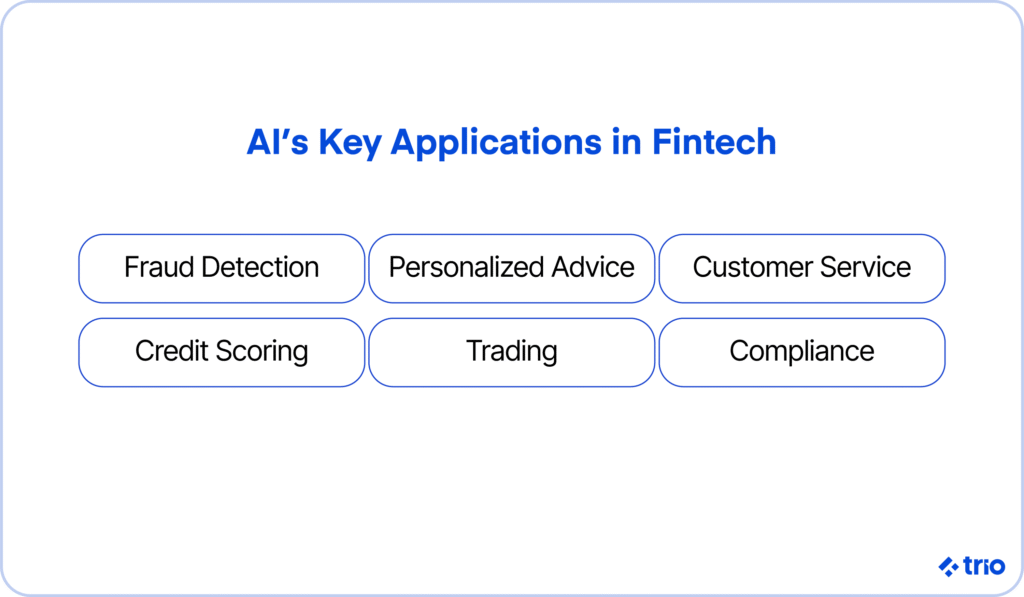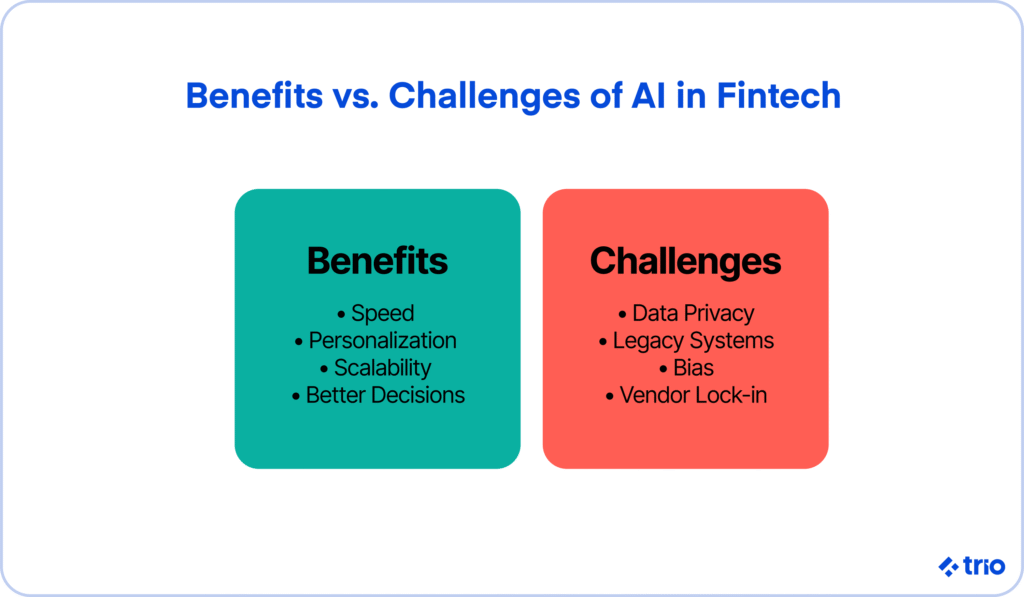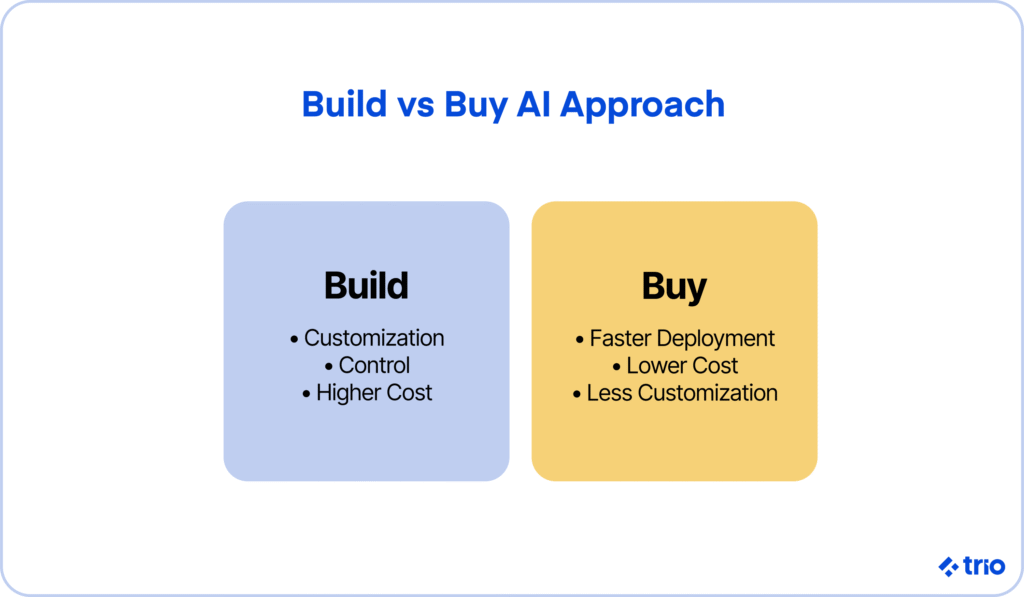AI (artificial intelligence) has changed every industry you could think of. Financial technology has been no different.
With change comes both opportunities and challenges. Therefore, if you are a fintech leader, understanding how to utilize AI models to revolutionize your products and services, or even automate internal processes to enhance your company’s productivity, is essential for staying ahead.
In this article, we’ll look at everything you need to know about AI’s true impact on Fintech, so you can prepare for any potential challenges and identify opportunities for your fintech applications.
We have been providing developers to companies through staff augmentation and outsourcing since 2019. As our focus is on Fintech, not all types of software development, our people are able to stay at the forefront of the industry, learning about the latest technologies, their risks, and their applications.
Our developers are well-versed in creating and integrating AI systems into existing products, as well as helping companies with legacy software prepare for the integration of AI tools in the future.
However, before you consider hiring developers for your team, let’s ensure you have a thorough understanding of AI in the fintech landscape.
AI’s Impact on Key Areas of Fintech
We’ve seen AI transform several parts of the finance sector, including financial processes, product experience, and backend efficiency. Here are the practical examples our developers have encountered.

Fraud Detection and Prevention
AI is probably most famously used for real-time fraud detection and the resulting fraud prevention. Using AI algorithms is very popular for a reason, as the detection rates are as high as 87-94% according to a meta-analysis.
The machine learning algorithms that power these AI solutions learn from existing patterns in transaction data, and also learn in real-time, allowing them to adapt as threats do.
Personalized Financial Advice and Tools
Financial services like robo-advisors and tools that provide investment advice were previously restricted to the very wealthy and those with access to the facilities where these professionals worked.
Now, robo-advisors powered by AI are available on a much larger scale and offer highly personalized information based on data about user behavior, their goals, and their risk management strategies.
AI-Driven Customer Service & Engagement
Think of the chatbots that act as the first line of customer service on many websites. These handle the most basic customer inquiries.
As a result, you need far fewer people in these roles, reducing your support costs while improving user experience through near-instantaneous responses. Gartner predicts that within the next two years, almost a third of all companies will use chatbots as their primary customer service channel.
And as LLMs (Large Language Models) improve, we suspect this number will continue to increase.
Credit Scoring and Risk Modeling
AI is revolutionizing the way companies assess credit scores and manage risk in sectors such as lending.
There is a lot of information that traditional credit scores cannot take into account, especially in regions where people might not have had access to the services that would create the financial information used to create the score.
Instead, AI can take a variety of information into account, including alternative data such as utility payments or phone usage, to build a more comprehensive score that promotes financial inclusion.
Trading and Investment Management
AI-driven financial insights can help companies identify trading signals, manage portfolios, and even execute certain trades automatically when the conditions are correct.
In 2023, it was estimated that nine out of ten hedge fund traders would use AI. We can only assume that that number has continued to grow.
The reality is that the speed at which AI can analyze markets is not comparable to what humans are capable of. The same can be said for the size of the trends it is able to pick up on.
Regulatory Compliance (RegTech)
Since regulatory compliance varies significantly depending on the region where financial services are delivered, many companies are utilizing AI to manage the diverse requirements.
RegTech automates required monitoring, reporting, and even documentation, so you can rest easy knowing that you are compliant with all the relevant financial regulations.
Experienced developers can help you identify the best RegTech solutions for your financial system and integrate these tools seamlessly, ensuring they work exactly as intended without negatively impacting the speed and efficiency of the rest of your product.
Internal Operational Efficiencies
KYC (Know Your Customer) and AML (Anti-Money Laundering) are both crucial to ensure that any financial services are used appropriately and do not facilitate crime, especially in international transactions.
AI is revolutionizing fintech security measures, such as these, by automating workflows used to validate user identities and detect suspicious activity.
Automated document processing, as well as other types of internal automation, can significantly increase the speed of manual processing, enabling you to address large numbers of issues quickly.
Benefits of AI in Fintech
We have already covered a myriad of different benefits of AI when discussing how it is changing financial products and services. Consistently, across almost all parts of the financial sector, the benefits include increased efficiency and scalability, improved customer experiences, and more informed decision-making, leading to reduced risk.
Speed, Scalability, and Smart Automation
AI is used in a variety of fintech businesses to automate processes in their workflows. It is easiest to automate repetitive processes, such as data entry, invoicing, and others.
AI can also be used to provide insights in real-time, and based on far more information that any human could analyze. This makes decision-making processes faster, and provides more information to base those decisions on, allowing for better risk management.
Better Customer Experiences Through Personalization
According to EY’s consumer banking survey, 81% of Gen Z consumers believe personalization is great for their relationship with the financial institutions they use.
AI is making this personalization better than ever, increasing customer engagement and ultimately their brand loyalty.
The result is a long-term increase in not only income but also general brand reputation, making it easier to stay afloat in a rather turbulent industry.
Reduced Risk and Smarter Decision-Making
As mentioned above, AI can be used in the fintech industry to analyze large quantities of data, providing more information that can then be used in decision-making processes.
However, this is not where AI’s analytic capabilities end. In many cases, AI can start making predictions based on the information that it has, which further improves risk management and decision-making.
Challenges and Limitations
While the potential of AI in Fintech is incredible, it is important not to get carried away before you are aware of the risks that implementing the technology in your company may hold.

Data Privacy Concerns
The world is becoming increasingly aware of the consequences of being too open with clients’ data. If you are in the financial world, any software will deal with highly sensitive information.
There can be serious legal and social consequences that result from failing to put the right security and data handling processes in place. Fines are the least of your worries. Downtime and lost reputation amongst your user base may have far larger financial implications.
Consider regulations like GDPR, CCPA, and the EU AI Act carefully to ensure that you are compliant with any regional regulations.
Implementation Challenges in Regulated Markets
Banking can be very heavily regulated. Since many institutions are older, the software that they have in place might be outdated, relying on siloed infrastructure, or you may find that the quality of the data they have is not ideal for training AI models.
Legacy software makes modern tech integrations more difficult, leading to both increased costs and time. However, outside of technical difficulties that result from outdated technology, you may find that regulatory compliance is also an issue when you start introducing complex financial features.
Bias, Hallucination, Vendor Lock-in
AI-powered financial technology is far from perfect. Since the processes behind AI can be so complex, it can be difficult to pick up when something goes wrong.
Some of the most common issues that arise in AI-powered financial services include biases and hallucinations.
Biases occur when the model has been trained on an unbalanced dataset, so it ends up favoring one group over the other, when considering generative AI, like the kinds that power AI chatbots and virtual assistants, it seems like the models often hallucinate data, which makes their responses odd and inaccurate.
Auditing your models and setting them up in such a way that you promote transparency and explainability is incredibly important.
Finally, be wary of the vendors that you use. If you only have one AI provider that can power your solutions, you will suffer from any downtime on their side. Always make sure you have a backup to manage your overall risk.
Ethical and Responsible AI
Many new AI regulations can be easily met if you consistently try to use AI as ethically and responsibly as possible, taking the challenges into account.
Bias in Credit Models and Lending Algorithms
We already discussed how AI systems can form biases of their own. These biases are most impactful in lending decisions, where an unbalanced historical dataset may cause the system to penalize minority groups.
There are now companies, like Upstart, that are developing tools specifically to detect AI biases, but for now, it’s still quite a big challenge.
An experienced developer can help you audit your algorithms to make sure that everything is still above board.
Transparency and Model Explainability
Black-bix systems, or those that cannot be explained, are not acceptable in finance any longer.
XAI (Explainable AI), or having a decision-making process in your algorithm that can be audited and understood by humans, is a requirement for everyone from regulatory bodies to senior executives and funders.
We can help you ensure explainability when it comes to credit and fraud decisions, or any other AI-driven processes that may impact your business.
How Fintech Companies Adopt AI
If you are interested in the use of AI, there are several different factors to consider as a technology leader in the fintech space.
Build vs Buy Decisions for a CTO
You can either build your AI systems in-house or buy them from a third-party vendor. The two options offer a range of benefits and drawbacks.
Building your own system in-house can let you customize your model extensively, setting you apart from your competition and giving you control over the entire process. However, this can also be very expensive and isn’t feasible for many smaller companies.
Buying something offers you speed and often a lower cost. But this comes at the expense of limited customization and risks associated with vendor lock-in.
A lot of the fintech companies that we have worked with go with a hybrid approach, where they purchase models where it makes sense to do so and build models where they need customization.
For example, you might decide to purchase a chatbot for your website, but you may also decide to build an AI model that plays a role in your fraud detection.

Creating an AI-Ready Data Strategy
Regardless of whether you decide to purchase or build your own systems, AI doesn’t work unless it is trained on high-quality, well-structured data.
Start your data audits, consolidate fragmented sources, and make sure you have governance methods in place before your model needs to be trained to save time.
We also recommend that you define your meta standards and make sure any data privacy or security protocols are in place before you start giving algorithms access to highly sensitive information.
MLOps, Compliance, and Cross-Team Alignment
You need the right people on your team, as well as a full MLOps strategy to make sure that you employ and maintain your AI effectively.
This strategy should include things like monitoring, automated retraining, and CI/CD pipeline integration.
Your compliance, risk, and legal teams should also be involved in the project continuously to ensure that you aren’t falling behind in any key areas and building up extensive technical debt that will be expensive and time-consuming to fix later.
The Future of AI in Fintech
Being prepared for the future of finance means that you need to be aware of any new trends in the industry.
Open-Source Models and Vertical AI Startups
Open-source AI models are making it a lot easier for smaller companies and startups to use AI. A lot of these tools are also more transparent than some commercial APIs.
There has also been a rise in vertical AI startups that are tailoring their models for niches like lending, insurance, investment, wealth management, and more.
Since the standards in the Fintech industry are so high, identifying a niche that hasn’t been addressed yet and building a tailored solution could be an incredible opportunity.
Embedded AI in SaaS Fintech Platforms
AI is becoming a big part of SaaS. In Fintech, this software does everything from underwriting to automating reconciliation.
High-level executives and CTOs are prioritizing APIs and modular architectures so that they can use these AI features in products that they can continue to adapt to meet shifting market conditions.
AI-Native Financial Products
AI is becoming the core of a lot of offerings, instead of just part of an additional feature. These systems that rely so heavily on AI are called ‘AI native’ and include anything from real-time personalization to behavior prediction.
Autonomous budgeting apps are probably the most popular solutions on the market at the moment.
We expect the increased use of AI-native products and increased exposure to the user experience and speed that these solutions can provide to shift user expectations for other apps.
If you need experienced developers to help you create your own AI applications or integrate other AI components into your app effectively, we can help.
Our developers are not only experienced in all things AI, but are also Fintech specialists. This means they can help you deal with common challenges proactively and help you scale in the most cost-effective way.
For more information about our developers from Latin America or Africa, or to initiate the hiring process, please reach out to schedule a free consultation.





